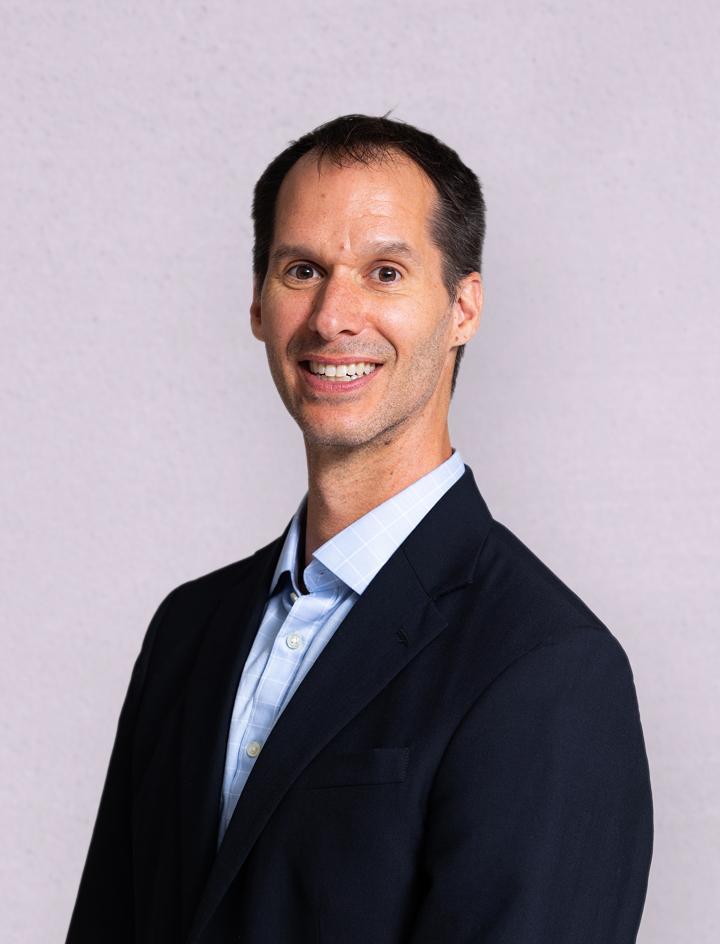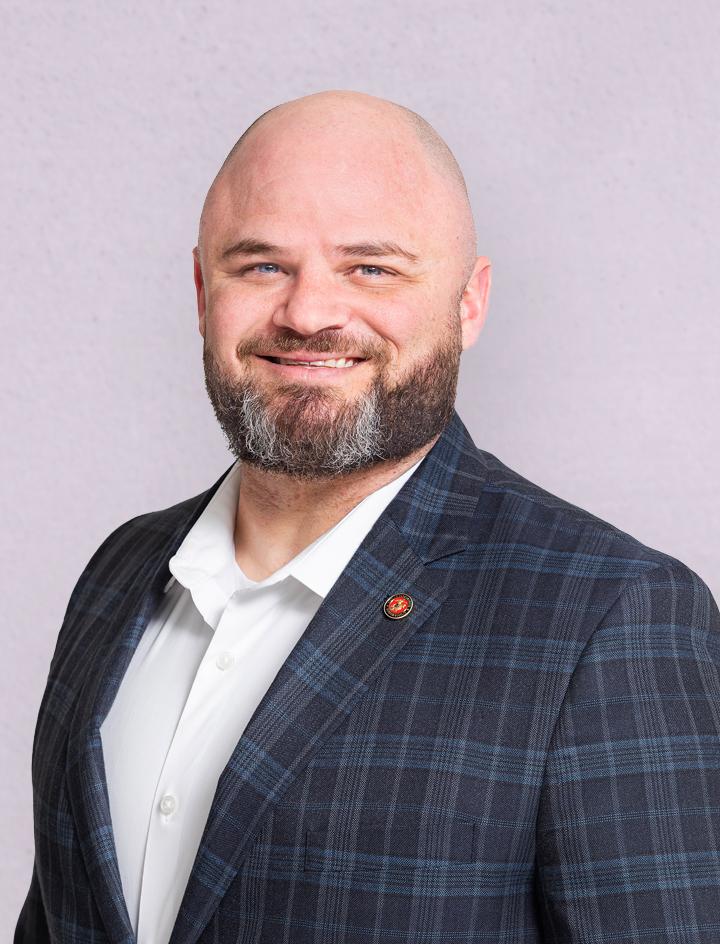FinServe Ambassador on Keys to Effective Practice Management and Recruiting

An alumnus of The American College of Financial Services, a member of The College’s FinServe Network, and an executive business consultant at Diversified, LLC in Wayne, Pennsylvania, Rosenzweig’s career in financial services spans over 30 years – and as he doesn’t hesitate to tell people, it hasn’t always been an easy road.
Finding the Financial Services Profession
Growing up in Minnesota and following the traditional path to university education, Rosenzweig says his first diversion was discovering that college just wasn’t for him. Looking for other opportunities, he worked a variety of jobs until he, along with his brother and cousin from New Jersey, opened a “California-style” restaurant in St. Paul, Minnesota. The restaurant was named one of the top new restaurants in St. Paul in their year of opening. That experience taught him his first valuable lesson.
“There’s a few industries that people are very critical of, including food, medical care, and anything involving money,” he says. “From a client perspective, you don’t mess up any outcomes involving those topics. Because of that, there’s no shortage of opportunity in those professions for those who aren’t afraid to seek it out and pursue excellence.”
The beginnings of Rosenzweig’s ventures into financial services included some real estate investing and breaking into the fields of insurance and banking as they began to broaden their array of financial products to customers. “Black Monday,” the severe stock market crash in 1987, further molded his experience, and surviving that lesson crafted a career of working in bank financial services, global investment banking firms and then, finally, beginning and running his own firm for the last 20 years. Along the way, he noticed some common and troubling trends that made him question the assumptions of those around him.
“I became conscious that certain types of investments very popular in financial circles didn’t work well practically,” he says. “In addition, financial firms weren’t always allowing you to work for the benefit of the client. Many firms were trying to be the McDonald’s of financial services: serve as many clients as possible with little regard to the quality of product or service.”
A People-Focused Approach
It was this experience that led Rosenzweig to the conclusion that would drive the rest of his career: financial advisors and their practices must seek to be holistic in nature, encompassing as many potential client needs as possible while still maintaining excellent service and quality care. This switch from serving many clients to serving clients’ needs more effectively took him away from big firms and into the more independent space of registered investment advisors (RIAs), which at the time were still in their infancy. Today, he works with Diversified, LLC, the result of a merger between his independent practice and a larger multistate, Delaware-based company. In many ways, this merger was the fulfilling and meaningful role he’d been searching for.
“We have a very diverse client base: entrepreneurs with pension plans and 401(k)s, high-net-worth clients that have been with me from my banking days, and a large segment of middle-class clients who are fairly new or naïve in regard to investing,” he says. “Through our diligence, honest approach, and hard work, our clients trust us, and although younger advisors may lack perspective gained through experience, I was able to convey my expertise and decades-long insight in their training. It’s very important to get to know the client, their concerns, their goals, and their hesitations because I’d been where they are, understood their points of view, and had the work ethic and desire to give them excellent service. We developed a strong bond that allowed us, in many cases, to work with three generations of client relationships.”
“It’s very important to get to know the client, their concerns, their goals, and their hesitations.”
Rosenzweig says the benefits of the merger have been an increased focus on advisor education for employees, while also becoming big enough to split up responsibilities like planning, running meetings, compliance, and back-office duties, and departmentalize things he used to have to do by himself. He says these days, he’s been able to transition into a more supervisory role as the second generation takes over at the firm.
“I’m mostly there to make sure clients are confident in the direction the firm is going, especially when we’re dealing with their major inheritances,” he says. “My job is less to manage the day-to-day and more to send a unified message to clients, and with where I’m at in life now, that’s quite a relief. I’ve also been able to broaden my reach through consulting, volunteering, seeking to serve on company boards, and getting to know other prominent people in the industry.”
However, it hasn’t all been smooth sailing. Rosenzweig says he’s had issues in the past with some new hires and even longtime employees not working out, and the lesson it’s taught him has been that trust and value alignment are indispensable to a practice running smoothly.
“When you’re interviewing people, you have to make sure they’re honest, hard-working, and above all, trustworthy,” he says. “Some will get burned out too quickly because the business moves so fast and have to leave. Others may try to take your clients and go elsewhere because they feel you or the firm owes them something. A sense of ethics and responsibility is key to a good hire.”
The Importance of Expanded Education
Another aspect that makes advisors and firms stand out from their competition, Rosenzweig says, is education – and that’s where The College and its programs come in.
“The College does a great job with its retirement, tax planning, and insurance knowledge through designations like the Chartered Financial Consultant® (ChFC®) and Chartered Life Underwriter® (CLU®). What I learned gave me the confidence and knowledge to get creative with helping business owners and others in need of succession planning fund their own retirements,” he says. “There are so many nuances to product uses, tax laws, and other considerations, and even if some clients don’t perceive a difference, there’s still a huge shift in the quality of advice you can give.”
“What I learned [at The College] gave me the confidence and knowledge to get creative with helping business owners and others in need of succession planning fund their own retirements.”
Rosenzweig says another element of his life that has made him better and more successful in his career and life at large is his personal passion: a decades-long study of the martial arts earning him multiple black belts in several martial arts disciplines. “The martial arts emphasize the need to become well-rounded through the exercise and training of the mind, body, and spirit. The strengthening of will and the concept of ‘indomitable spirit’ builds patience, resilience, confidence, and moral strength,” he says. “It would be easy to succumb to circumstances, market fears, client pressure, and self-doubt that could cause me to question my strategy and financial plans to the detriment of the financial health of clients without the moral strengthening my martial arts experience has given me.
In addition to building character through the martial arts, Rosenzweig has cultivated a network of friends and classmates about whom he readily declares, “They have my back, as I have theirs.” He has even acquired new business from fellow martial artists, as the bonds they form in their classes go beyond studying, training, and perfecting fighting skills to a more personal level. “The formation of trust and respect for intelligence and acumen motivates fellow students to come to me, and I am happy to provide a second opinion on their plans or thoughts. Often, this has resulted in new clients for our firm over the years,” he says.
Returning to the financial services space, Rosenzweig notes responsibility for training today is much more on individual advisors – and advisors need to live up to their duty to give excellent service.
“Retirement planning is extremely important in this day and age, especially for retiring business owners. In general, advisors should get as much knowledge as it takes to help their clients achieve their goals in new and creative ways,” he says. “Expanding your opportunities isn’t just an option: it should be a moral imperative for all of us in the profession.”
“Expanding your opportunities isn’t just an option: it should be a moral imperative for all of us in the profession.”
AI, Prompt Engineering, and Financial Planning

Our thought leaders present on the intersection of AI and financial planning, including how the science of prompt engineering can empower you with the skills to use AI to its greatest potential in your workplace and on behalf of the clients you serve. College and CFP® CE credit is available!
This webcast is only open to members of The College’s Professional Recertification Program (PRP) and available in Knowledge Hub+. Log into Knowledge Hub+ via your Learning Hub.
Presenters
What is Knowledge Hub+?
Knowledge Hub+ is a just-in-time learning and CE platform developed by The American College of Financial Services exclusively for The College's Professional Recertification Program members that curates the wisdom of leading academics, change-makers and innovators, financial planning experts, and practice management leaders into one easy-to-use learning experience for financial professionals.
Knowledge Hub+ delivers the added value of automated reporting of CE credit to the CFP Board and The College’s records, making it easier for financial professionals to fulfill their thirty-hour CE requirements every two years without administrative headaches.
With exclusive live events and new content added quarterly, there’s always something new to learn with Knowledge Hub+.
Ethics In Financial Services Insights
Executive Education from the Leaders in Applied Ethics

Recognizing this gap, The American College of Financial Services developed the Trust & Leadership Certificate Program, designed to equip home office leaders with the skills necessary to build and restore trust with their field force, home office colleagues, and ultimately consumers.
The program is a cohort-based model meant for 10 to 30 select leaders at a single firm working at their corporate or home office. It’s the only executive education program to address the implications of trust between home office leaders and their field force, their colleagues, and their clients.
Participants meet for 10 hours of learning either in-person, fully remote, or hybrid, with approximately five hours of pre-reading and prep time. In-person sessions can be conducted on company grounds or as part of an existing engagement opportunity (e.g., a company retreat). Summarizing their experience in the program, one leader remarked, “Understanding the different trust challenges that the groups presented will enable me to use the information when coaching my team and working with peers.“
The centerpiece of the program is a capstone project. Participants work with their peers to workshop a real-world trust and leadership challenge for review. In a final group presentation, participants offer an analysis of the challenge and a plan to address it. In doing so, the capstone enables participants to apply the insights and tools learned in the program and positions them to lead on trust within their companies.
Enrollment is limited, so don't wait!
The Elements of Greatness
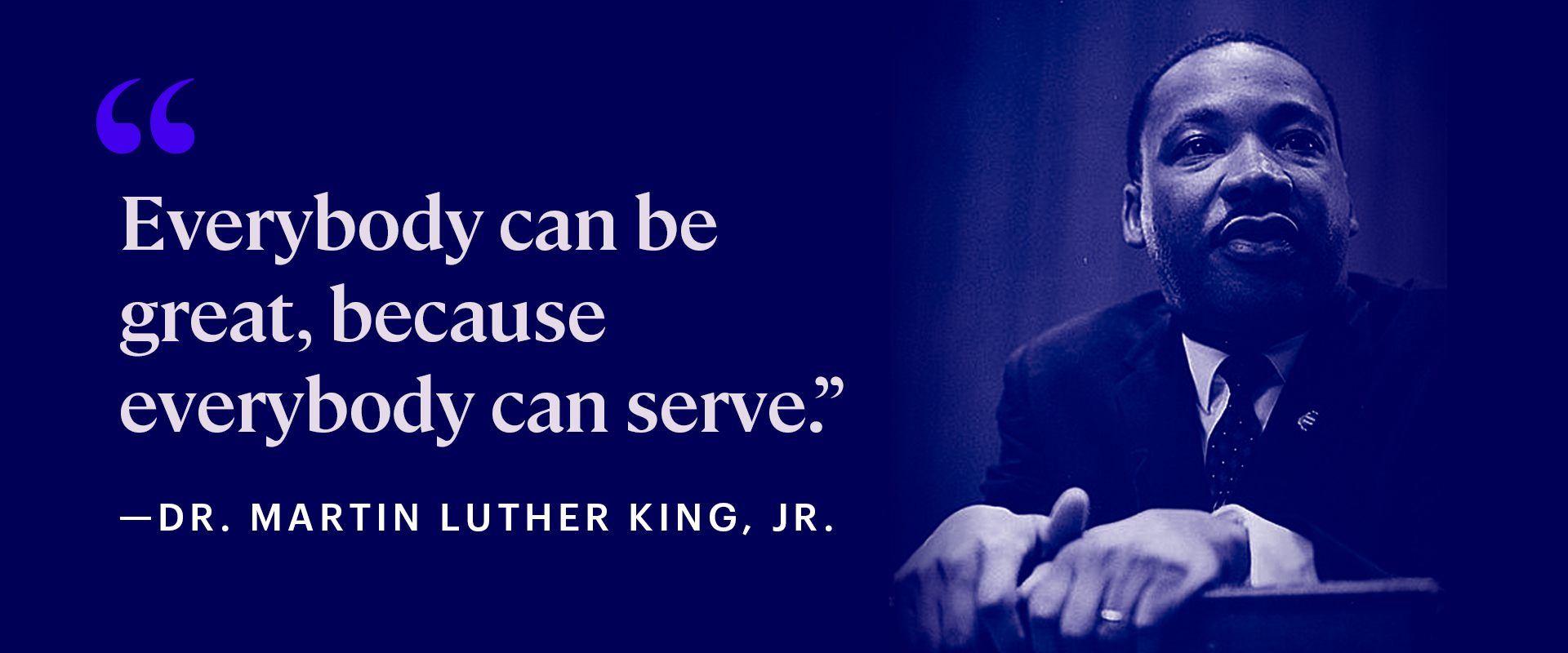
King valued education. Indeed, he worked hard and studied for many years to become a highly educated man. After earning his Bachelor of Arts degree at Morehouse College, King went on to earn his Bachelor of Divinity at Crozer Theological Seminary, followed by his doctorate in systematic theology at Boston University.
To understand why King pursued education at the highest levels, look no further than his own writings. Toward the start of his academic journey while at Morehouse, King wrote, “Intelligence plus character—that is the goal of true education.” (I encourage you to read King’s full article here.) Considering his perspective on education, not to mention his chosen discipline (theology), one might infer King’s experience in higher ed influenced his development as a leader, in addition to growing his knowledge base.
Like King, I have always been a believer in education. Like King, I see education as but one way to fulfill a higher calling. Many years after setting out on his journey through higher education, King would go on to say that education was not requisite for greatness. In a sermon delivered just two months before his assassination, King preached:
“If you want to be great—wonderful. But recognize that he who is greatest among you shall be your servant. That's a new definition of greatness. [And] the thing that I like about it: by giving that definition of greatness, it means that everybody can be great, because everybody can serve. You don't have to have a college degree to serve. You don't have to make your subject and verb agree to serve…You only need a heart full of grace. A soul generated by love. And you can be that servant.”
—Dr. Martin Luther King Jr.
“The Drum Major Instinct,” February 4, 1968, an adaptation of the 1952 homily by J. Wallace Hamilton (full sermon here)
As educators, as students, and as proponents of lifelong learning within our domain of applied financial knowledge, what might we make of King’s stance on education? Here’s what I believe it means: Although King loved learning, he loved service even more—and the lesson is to apply education in service to others. Formal education (whether a college degree or a College designation) itself is not the key to greatness. Instead, it helps build knowledge, intelligence, and character, which, together, equip us to lead lives of service. Only then can our impact be truly great.
This holiday, let’s align our educational goals to our life goals. Let’s pursue education that builds knowledge, intelligence, and character. And let’s apply what we learn in service to others—with faith, as MLK possessed, that our lives may serve a greater purpose.
New Members to Join the 2024 Alumni Council

Michaela Scott, MSFS, CLU®, ChFC®, RICP® will be stepping into the role of Alumni Council President at The American College of Financial Services in 2024, taking the baton from Scott Winslow, MSFS, ChFC®, CLU®, RICP®, CCFC. Thanks to Winslow’s stellar leadership over the past few years, the Alumni Council is stronger than ever and has established a foundation for continued year-over-year success. The College believes there is no one better than Scott to continue that momentum.
New Members to the Council
Joining the new president, along with the rest of the Council, will be four new members.
Heather Welsh, CFP®, AEP®, MSFS is a vice president and the wealth planning department leader at Sequoia Financial Group, where she determines strategic direction for the planning solutions created for clients and oversees the management and career development of Sequoia’s wealth planning team. Throughout her career, Heather has been motivated by a single ambition: to make wealth planning accessible, relevant, and personalized to each individual and family she serves. She is also passionate about supporting the next generation of professionals, serving as a mentor, women’s initiative advocate, and past “Ask the Expert '' panelist through the CFP Board and by volunteering in the classroom through Junior Achievement. Her impact has been broadly recognized, as she has received the Greater Akron Chamber’s 30 for the Future award, and she was the recipient of the Women Working in Wealth Award by The American College in 2022.
Jason Austell MSFS, CFP®, CHFC®, CLU®, CASL®, RICP®, AEP®, CAP®, CHSNC®, CPFA® has over 20 years of experience working with clients in both the personal and professional markets. In addition to his many designations, Jason completed his master’s in financial services (MSFS) at The American College of Financial Services in 2017. He is a past President of NAIFA NC and has been a member since he began his career. He is also a member of the Charlotte Estate Planning Council, Society for Financial Service Professionals, and the Rotary Club of Gastonia.
Julie A. Pinkerton, CLU®, ChFC®, LUTCF® is the CEO of Evozen, LLC. Evozen’s ClientFirstTM is the only national, fully diverse digital community that creates the right environment for people to connect in order to provide top service to their clients and solve their most challenging problems. Additionally, the ClientFirstTM community unites independent Rainmakers in insurance, investments, law, and tax as Centers of Influence. Julie is also a contributing writer for U.S. News & World Report, focusing on financial topics and she is in the midst of authoring a book, "BLINK, Because Life Isn't Neat & Clean."
Sahar Pouyanrad, EMBA, CTFA, AEP®, CEP, ChSNC® is an executive director and the West Regional Trust Team leader for the Trusts and Estates Team for J.P. Morgan Private Bank. In this capacity, she is responsible for oversight and administration of trust accounts and related services for the firm’s fiduciary clients across the West Region, with a primary focus on ultra-high-net-worth families. As the Head of New Business, Sahar is also responsible for partnering with legal, compliance, and risk to drive new business, manage risk by overseeing review of potential trust and estate opportunities, and work with senior leadership to set new business parameters relating to trusts and estates. Sahar is also an award-winning member of the Toastmasters International and a frequent speaker on trust and estate subject matters.
Mission
The Alumni Council’s mission at The College is to:
• Identify new ways to promote student success and engagement.
• Create a supportive community that values inclusivity and collaboration.
• Help students meet their full potential and exceed their own expectations.
The College is sincerely grateful for the contributions of all its returning members and is excited to welcome its new ones to the ongoing effort to embody the Council’s mission in support of helping The College embody its own.
Ethics In Financial Services Insights
Factors Influencing Trust Formation in Financial Services

In business, trust is critical. In financial services, it’s even more so because of the fiduciary nature of many relationships in the industry. In their presentation, Drs. Pattit and Pattit explored the factors that contribute to the formation of trust for seven types of financial services providers.
Their analysis relied on 1,697 consumer responses to a self-administered online questionnaire. The questionnaire permitted assessment of trust levels held by: (1) consumers who had a relationship with a financial institution; and (2) consumers with no relationship, but familiarity with a particular type of service. The results show that there is a marked difference in the level of trust between the two groups for all seven types of financial services.
Investigating this “gap” further showed that the factors contributing to the formation of trust differed between the two groups. These findings offer three practical implications for financial services companies. First, companies need to demonstrate consistent values in all channels, including operations. Second, companies can be intentional about creating “experience points” for building trust. Third, companies need to recognize that bad experiences negatively affect trust and spill over into other areas.
Further insight on these recommendations for practice and the analysis behind them were presented in a poster at the 7th Annual Academic Research Colloquium of the CFP Board Center for Financial Planning on December 7, 2023, in Arlington, Virginia.
A related research brief, Pathways to Trust in Financial Services: A Closer Look, is available for download from the Center for Ethics’ website. The data explored here is applied further in the Center’s Trust & Leadership Certificate Program.
Career Pathways in Financial Services for Military Members in Transition

Choosing the right post-service career can be a complex process for veterans, active-duty military looking ahead, and their family members, each of whom face unique challenges.
Yet, with the right mix of knowledge, support, and sponsorship, there are many fantastic career paths available to those in the military community, including in financial services.
To help veterans, their families, and other military personnel find their way, The American College of Financial Services and its Center for Military and Veterans Affairs has created a unique guide.
In this guide, we cover:
- The challenges former service members may face as they transition to the civilian workforce
- The financial services industry and why it may be a great fit for veterans and their families
- What a lifelong financial services career may look like
- The resources available to help veterans with their transition to financial services
Diversity, Equity & Inclusion Insights
Celebrating the Generosity and Impact of Our Visionary Donor
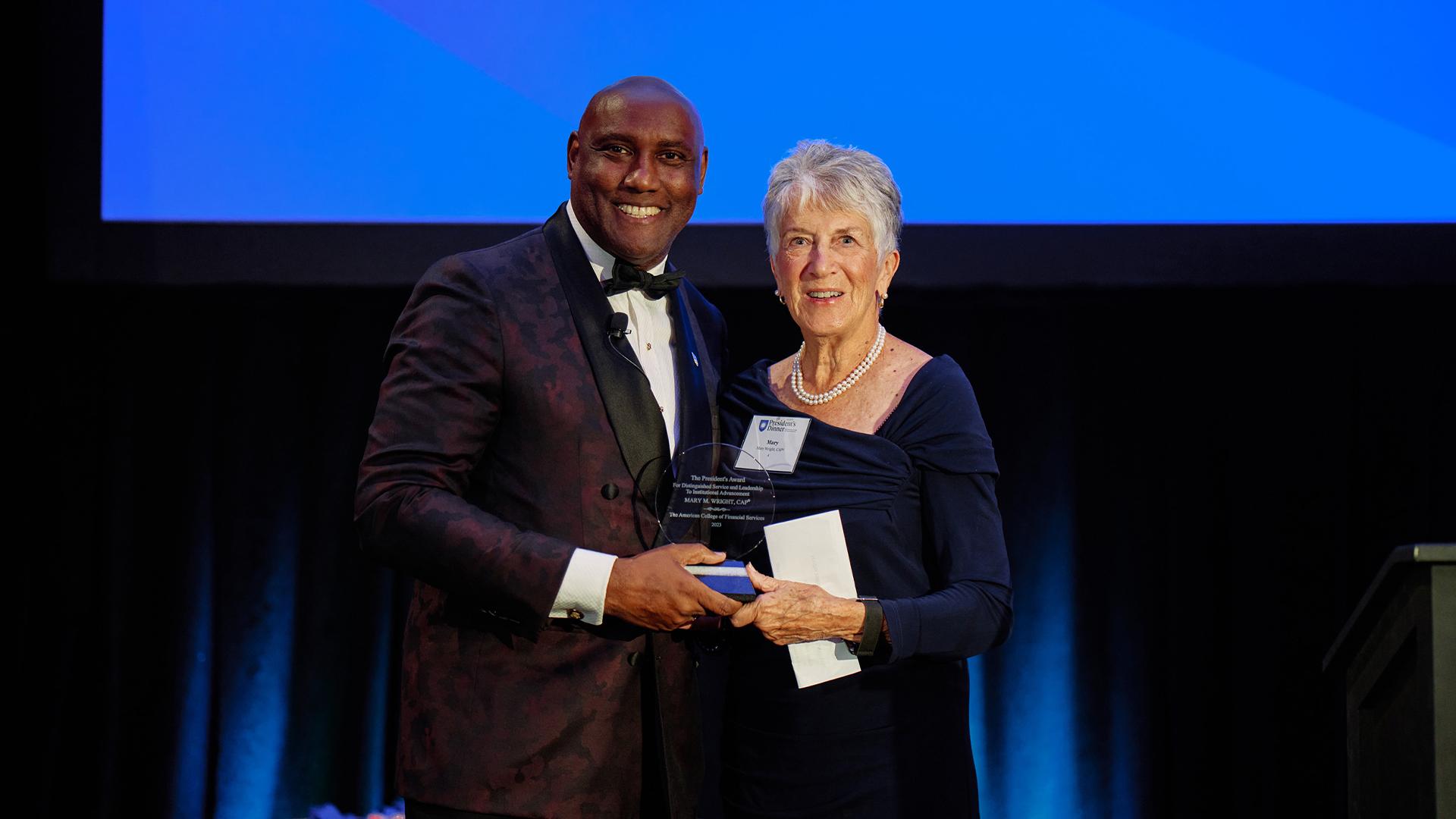
In the world of research and advocacy, dedicated individuals and organizations play a pivotal role in bringing meaningful change to society. At the Center for Women in Financial Services, we are honored to acknowledge the profound impact of a generous donor, Mary Wright, whose vision and philanthropy have paved the way for developing a successful research enterprise, one that has shone brightly in media mentions and professional circles.
The journey towards transformative change began with Wright’s generous contribution to establishing an impactful research project in late 2020. Her support allowed the Center to conduct vital research exploring the unique traits of successful financial advisors. This visionary donation set in motion a series of events that have enriched our understanding of what contributes to success as a financial advisor and provided ample evidence for industry partners to better understand the unique needs of female professionals in the industry. The research earned six industry trade publications placements within two weeks of the launch and has appeared in white papers as well as numerous professional presentations reaching thousands of industry professionals.
The initial funding of the Traits of Successful Advisors research project laid the foundation for the Center’s research initiatives and contributed to the future research agenda. With Wright’s ongoing financial support, we established a research fellow position at the Center for Women in Financial Services, the esteemed Wright Fellowship. This fellow will work with our Research Director to collect data studying Gen Z perceptions of careers in the financial industry, their work attitudes, and strategies to attract more Gen Z women to the industry. Our research will enhance our understanding of Gen Z's work attitudes and interest in financial services. The fellow will play a crucial role in publishing findings, developing industry presentations, and creating educational materials for the financial services sector in Spring of 2024. We are grateful for Wright’s commitment to the Center and the mission to advocate, educate, and support the success of women at all levels within the sector.
With Wright’s continued support, the Center for Women in Financial Services is well-positioned to continue advocating and educating the industry on the critical need for supporting women in finance at every level. Our mission to break barriers and empower women in this field would not have been possible without the unwavering generosity of our donor, Mary Wright, who has enabled us to bring about lasting change in the industry.
In conclusion, we extend our deepest gratitude to our visionary donor, Mary Wright, for her commitment to our cause and her invaluable contribution to the success of our research enterprise. We look forward to continuing our work, striving to create a more equitable and inclusive financial services sector, and making a lasting impact on the lives of women in this industry. Together, we can bring about positive change and inspire future generations to follow suit.
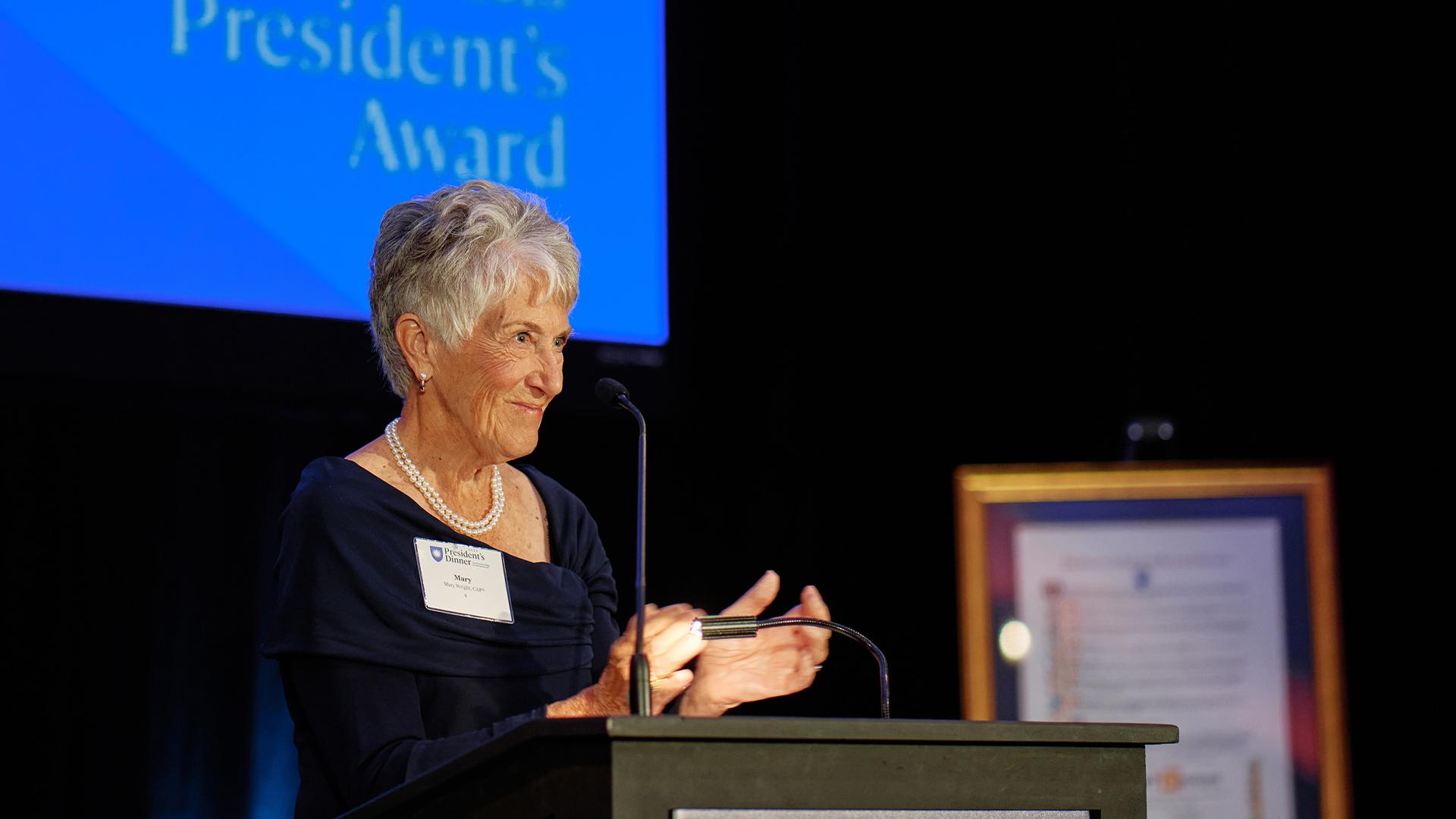
Diversity, Equity & Inclusion Insights
The Future of the Women Working in Wealth Community
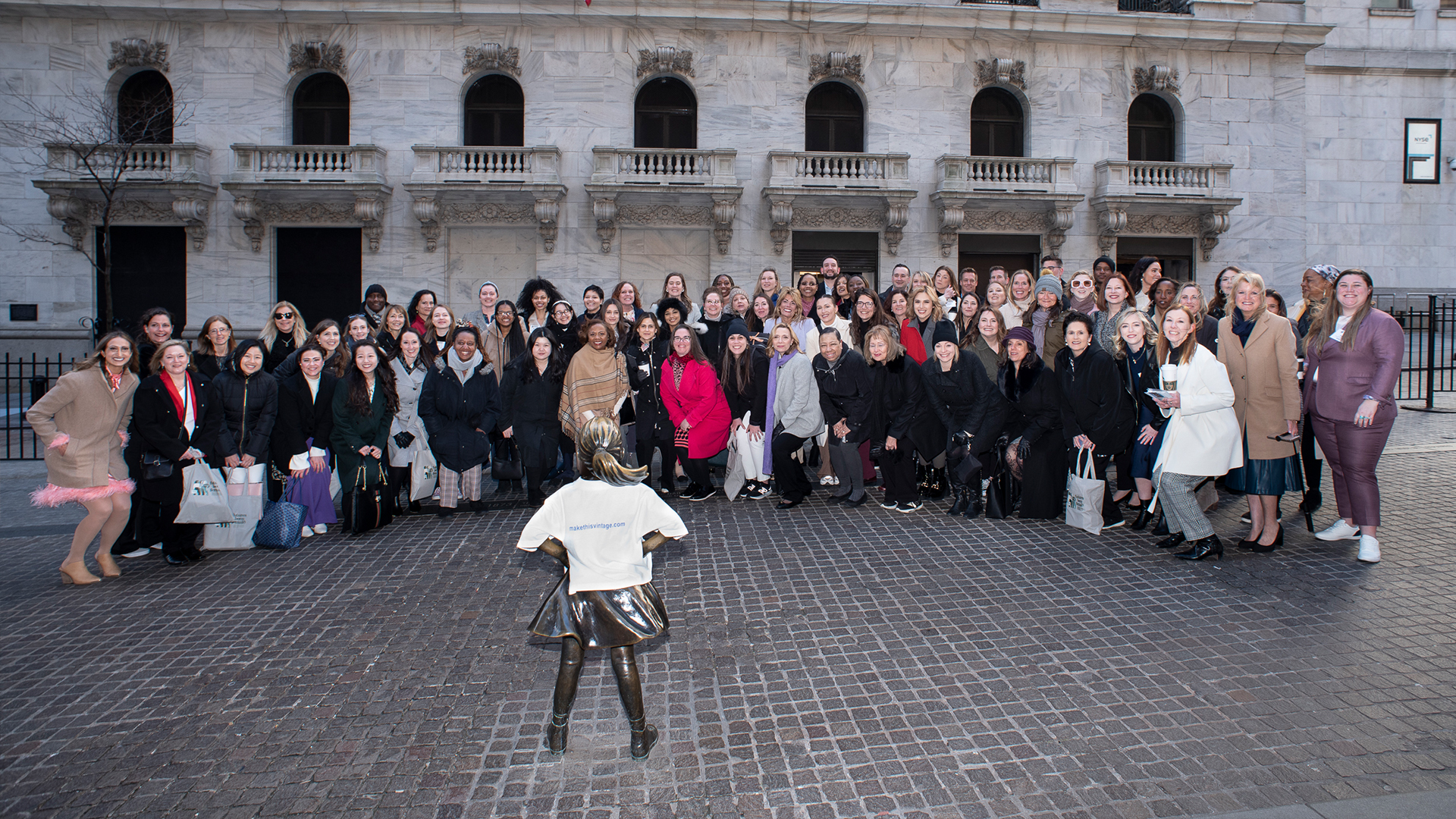
In a strategic move towards enhancing accessibility and amplifying impact, the Center for Women in Financial Services is gearing up for a shift from a singular Women Working in Wealth Summit & Awards Signature Event to a series of dynamic micro-events hosted at various locations across the nation. This evolution aligns seamlessly with the broader vision of The College: to elevate the profession's expertise through specialized financial knowledge and education.
Diverse Avenues, Richer Understanding: The New Landscape
The decision to migrate to smaller, targeted events reflects a commitment to championing professional diversity and transforming avenues of access to financial expertise. Recognizing the disparities in the services clients expect versus what they receive, The College is determined to bridge this gap. With participation in events such as the NAIFA Women’s Fly-In in Washington DC, FA Magazine’s Invest in Women in West Palm Beach, FL, and the IN Women Advisor Summit in Chicago, the aim is to foster a more inclusive representation within the financial services sector.
Opening Doors to Career Success: A Commitment to Diversity
At the heart of this transition is the goal to tackle advisor shortages and increase diverse representation within the industry. The micro-events, strategically located across the US, provide a platform to attract, recruit, and retain advisors from all backgrounds. By connecting with organizations like Women in Insurance in Financial Services (WIFS) and participating in initiatives like the CFP Board Diversity Summit in Washington DC, The College aims to create innovative programming that opens doors to career success for a broader spectrum of professionals.
Holistic Planning for Every Stage: A Focus on Retirement Education
Recognizing the pressing need for comprehensive retirement planning, The College is prioritizing the deepening of retirement expertise among financial professionals. The micro-events offer a unique opportunity to disseminate vital retirement planning knowledge. This focus is not limited to a specific age group; it extends to every American seeking financial security. By participating in events like the Carson – Excell Represent, The College is actively contributing to a holistic approach to retirement planning at every age and stage of an individual's wealth-building journey.
Empowering Individuals, Transforming the Future
As The Center for Women in Financial Services aligns itself with The College's overarching vision, it sets the stage for empowering individuals and transforming the future of the financial services sector. By hosting micro-events in key locations and participating in diverse industry summits, The College is not just responding to changing needs but actively shaping a new era of financial specialists. The focus on education, diversity, and retirement planning reflects a commitment to bridging gaps, opening doors, and ultimately, empowering a more inclusive and knowledgeable financial community. The journey from one signature event to numerous micro-events marks a strategic leap towards a future where expertise is diverse, knowledge is inclusive, and financial strength is within reach for all Americans.
Subscribe to Newsletter
Related Posts
Diversity, Equity & Inclusion Insights
Congratulations to our 2023 LPL Financial Scholarship Awardees
In 2023, we had the honor to award women designations beyond the WMCP® thanks to the generous contribution from LPL Financial. We applaud their dedication and commitment to advancing their knowledge and expanding their opportunities.
- Amanda Corral
- Anna N'Jie-Konte
- Carol Parrish
- Cherie Stueve
- Christina Vaughn
- Jasmine Bridges
- Kristin Feliz
- Lisa Macbeth
- Macey Markowitz
- Megan Mills
- Meredith Dean
- Mónica Clesse Meléndez
- Paula Kurday
- Rachel Sims
- Sara Griffin
- Sasha Walters
As this cohort embarks on this educational journey, we encourage women to make the most of the opportunities available to you. Their success is not only a personal triumph, but also a testament to the collective strength of women in the financial services sector.
Congratulations to all our scholarship recipients! Their commitment to excellence is inspiring, and we look forward to witnessing their continued growth and success in the financial services industry. May this scholarship be a stepping stone toward achieving their aspirations and making a lasting impact in the field.
